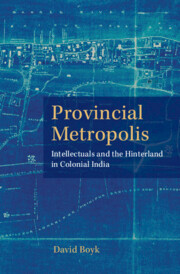Book contents
- Frontmatter
- Dedication
- Contents
- List of Figures and Maps
- Acknowledgments
- List of Abbreviations
- Note on Transliteration and Translation
- Introduction: Provinciality in Colonial India
- 1 A Length without Breadth
- 2 As Though in a Shrine
- 3 Collaborative Wit
- 4 A Sturdy Loyal People
- 5 Patna Capitalized
- Epilogue
- Glossary
- Bibliography
- Index
3 - Collaborative Wit
Published online by Cambridge University Press: 25 September 2025
- Frontmatter
- Dedication
- Contents
- List of Figures and Maps
- Acknowledgments
- List of Abbreviations
- Note on Transliteration and Translation
- Introduction: Provinciality in Colonial India
- 1 A Length without Breadth
- 2 As Though in a Shrine
- 3 Collaborative Wit
- 4 A Sturdy Loyal People
- 5 Patna Capitalized
- Epilogue
- Glossary
- Bibliography
- Index
Summary
“My dear Al-Punch! Mister Al-Punch! Brother Al-Punch! Mahatma Al-Punch!” Exuberant greetings regularly began readers’ submissions to Al-Punch, an Urdu newspaper published in Patna in the late nineteenth and early twentieth centuries. The affectionate verve of these salutations reflects the efforts of the paper's contributors to harness wit and intimacy as they built a public space linking them with readers and writers throughout northern India. By forging these connections, they sought to counter the marginalization of their city, region, and language. Notwithstanding the rising dismissal of old cities like Patna as stagnant and provincial, Al-Punch's disarming wit and collaborative spirit helped it cultivate what we might call an ordinary intellectual public: a zealous community of ordinary intellectuals, in ordinary places, who strove to claim a place in the wider world of print.
One of numerous Indian papers modeled on Punch, the famous London comic weekly, Al-Punch ebulliently embodied the symbiosis between the serious and the sensuous that characterized Indian commercial publishing in this period. As Francesca Orsini has argued, “oral-literate” texts brought new participants into the print sphere and fortified readers’ taste for heterogeneity in language, content, and tone. While many of the era's best-known publications were mouthpieces for individual personalities like the reformist intellectuals Bharatendu Harishchandra, ‘Abd al-Halim Sharar, and Sayyid Ahmad Khan, Al-Punch encouraged intimacy and dialogue with a collaborative ethic centered on its imaginary embodiment, Maulana Al-Punch.
Information
- Type
- Chapter
- Information
- Provincial MetropolisIntellectuals and the Hinterland in Colonial India, pp. 119 - 153Publisher: Cambridge University PressPrint publication year: 2025
